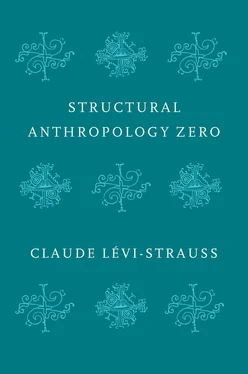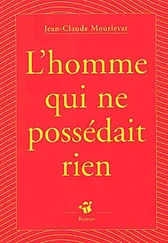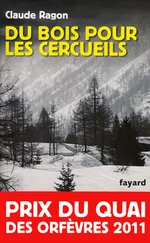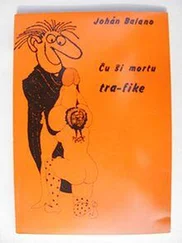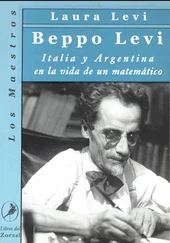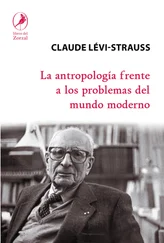1 1 Didier Eribon, Conversations with Claude Lévi-Strauss, Chicago, University of Chicago Press, 1991, p. 68.
2 2 Claude Lévi-Strauss, Structural Anthropology, New York, Basic Books, 1963, p. 328.
3 3 Eribon, Conversations with Claude Lévi-Strauss, p. 91.
4 4 Claude Lévi-Strauss, The Savage Mind, London, Weidenfeld & Nicolson, 1966, p. 247.
5 5 See Gildas Salmon, “Symbole et signe dans l’anthropologie structurale,” Europe, nos. 1005–6 (2013), pp. 110–21.
6 6 The title Structural Anthropology Zero emerged in 2011 in the course of a discussion with Laurent Jeanpierre and Frédéric Keck, as we envisaged the publication of a critical edition of these little-known articles. With this original project having fallen through, I am grateful to them for letting me use the title on which we had settled together.
7 7 Introduction to the Work of Marcel Mauss, London, Routledge, 1987.
8 8 Those who have offered commentary on this article, which represents a pivotal moment in twentieth-century French philosophy, include Maurice Merleau-Ponty, Claude Lefort, Gilles Deleuze, Jacques Derrida, Jacques Lacan, Roland Barthes, Pierre Bourdieu, Jean Bazin and Jacques Rancière.
9 9 See especially Pierre Clastres, Society against the State: Essays in Political Anthropology, New York, Zone Books, 1987.
10 10 Carlos Fausto and Marcela Coelho de Souza, “Reconquistando o campo perdido: o qui Lévi-Strauss deve aos ameríndios,” Revista de Antropologia, São Paulo, XLVII/1 (2004), pp. 98–9. See Vincent Debaene, “Claude Lévi-Strauss aujourd’hui,” Europe, nos. 1005–6 (2013), pp. 11–36.
11 11 The page number in parentheses refers to the present edition.
12 12 Eribon, Conversations with Claude Lévi-Strauss, p. 56. See also Roman Jakobson and Claude Lévi-Strauss, Correspondance, 1942–1982, Paris, Seuil, 2018, pp. 174–85.
13 13 This silence was by no means specific to Lévi-Strauss and indeed characterized all the contributions to the special edition of Esprit (though this was not the case for contemporary publications in Temps Modernes about the United States). Letters to his parents show that Lévi-Strauss had read Claude McKay, for example, and happily spent time in Harlem, particularly at the Savoy Ballroom, but, as in his writings of the 1930s on São Paulo, which occasionally mention black and mixed-race populations, he seems to conceive of racial discrimination as a historical remnant rather than as a pressing social and political issue.
14 14 The references for the original publications are available at the end of this volume.
15 15 See the polemical review of The Cambridge History of the Native Peoples of the Americas, Vol. 3: South America, published in L’Homme (nos. 158–9, pp. 439–42). Lévi-Strauss was to make a total of five contributions to the Handbook of South American Indians: the three articles that are included here rely in large part on material collected first-hand; they do not draw on the long article summarizing the available information on the tribes of the upper Xingu or on the ethnobotanical study (which was published in the sixth volume in 1950) on the native uses of wild plants in tropical America.
16 16 Eribon, Conversations with Claude Lévi-Strauss, p. 44.
17 17 On this long article of 1945 and the originality of what Lévi-Strauss calls “the French point of view” (p. 50), see Vincent Debaene, Far Afield: French Anthropology between Science & Literature, Chicago, University of Chicago Press, 2014, pp. 51–66.
18 18 The argument that follows is directly inspired by the work of Laurent Jeanpierre on the intellectual sociology of exile, in particular “Les structures d’une pensée d’exilé: la formation du structuralisme de Claude Lévi-Strauss,” French Politics, Culture and Society, 28/1 (2010), pp. 58–76.
19 19 See Laurent Jeanpierre, “La politique culturelle française aux Etats-Unis de 1940 à 1947,” in Alain Dubosclard et al., Entre rayonnement et réciprocité: contributions à l’histoire de la diplomatie culturelle, Paris, Publications de la Sorbonne, 2002, pp. 85–116.
20 20 See Jeanpierre, “Les structures d’une pensée d’exilé,” pp. 63–5.
21 21 An interesting chronicle of his progress can be found in the abundant correspondence he had with his parents, then in hiding in the remote Cévennes region of France. See Claude Lévi-Strauss, “Chers tous deux”: lettres à ses parents (1931–1942), Paris, Seuil, 2015.
22 22 See Laurent Jeanpierre, “Une opposition structurante pour l’anthropologie structurale: Lévi-Strauss contre Gurvitch, la guerre de deux exilés français aux Etats-Unis,” Revue d’histoire des sciences humaines, no. 11 (2004), pp. 13–44.
23 23 See Gildas Salmon, “Symbole et signe dans l’anthropologie structurale,” and Les Structures de l’esprit: Lévi-Strauss et les mythes, Paris, PUF, 2013.
24 24 Eribon, Conversations with Claude Lévi-Strauss, p. 14. See Lévi-Strauss, in “Chers tous deux,” letters of March 1933, pp. 272–6. See also Emmanuelle Loyer, Lévi-Strauss: A Biography, Cambridge, Polity, 2018, pp. 78–82.
25 25 “Model” is to be understood here not as a reality to be imitated but as a system revealing properties that cannot be readily observed otherwise. Models are generally formal, but the Nambikwara offered a rare empirical case of a social reality reduced to its essential properties.
26 26 See Emmanuelle Loyer, Paris à New York: intellectuels et artistes français en exil 1940–1947, Paris, Grasset, 2005.
27 27 On this point, see the very influential 1949 conference of the British sociologist T. H. Marshall, entitled “Citizenship and Social Class” (republished in Citizenship and Social Class, and Other Essays, Cambridge, CUP, 1950).
28 28 The report by the British economist William Beveridge in 1942 laid the theoretical bases for the welfare state. The relevant passage can be found in Tristes Tropiques, without, however, the discussion of forms of reciprocity that preceded it.
29 29 See the note on Tristes Tropiques in Claude Lévi-Strauss, Œuvres, Paris, Gallimard, 2008, pp. 1676–8.
30 30 Eribon, Conversations with Claude Lévi-Strauss, p. 50.
31 31 Daniel Fabre, “D’Isaac Strauss à Claude Lévi-Strauss: le judaïsme comme culture,” in Philippe Descola (ed.), Claude Lévi-Strauss, un parcours dans le siècle, Paris, Odile Jacob, 2012, p. 281.
32 32 Quoted in Loyer, Lévi-Strauss, p. 293.
33 33 See Wiktor Stoczkowski, Anthropologies rédemptrices: le monde selon Lévi-Strauss, Paris, Hermann, 2008, pp. 139–84.
34 34 Lévi-Strauss, “Chers tous deux,” p. 559.
35 35 Lévi-Strauss, Tristes Tropiques, New York, Atheneum, 1984, p. 24.
36 36 Ibid. Regarding this formulation, see above, pp. 27–9.
37 37 Eribon, Conversations with Claude Lévi-Strauss, p. 50.
38 38 Lévi-Strauss, Tristes Tropiques, p. 406.
39 39 Document written for the Peace Aims Group Council of Foreign Relations, cited in Loyer, Lévi-Strauss, p. 233.
40 40 Conversations with Claude Lévi-Strauss, p. 256.
41 41 Claude Lévi-Strauss, “Diogène couché,” Les Temps Modernes, no. 110 (1955), p. 1194.
42 42 Eribon, Conversations with Claude Lévi-Strauss, p. 256.
43 43 See the note to Tristes Tropiques in Oeuvres, pp. 1711–12.
44 44 See Stoczkowski, Anthropologies rédemptrices, pp. 26–33.
45 45 Ibid., pp. 224–42.
46 46 Claude Lévi-Strauss, “The Three Humanisms,” in Structural Anthropology, vol. 2, Chicago, University of Chicago Press, 1976, pp. 271–4.
47 47 Lévi-Strauss, “Reflections on Liberty,” The View from Afar, Chicago, University of Chicago Press, 1985, p. 282.
48 48 Lévi-Strauss, Tristes Tropiques, p. 57.
Читать дальше
